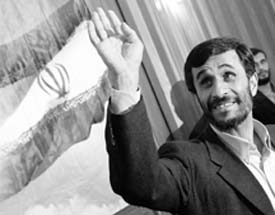|
DAILY NEWS ONLINE |
|
|
|
OTHER EDITIONS |
|
|
|
|
|
|
|
|
|
OTHER LINKS |
|
|
|
|
|
|
 |
|
The leadership change in IranTHE election of Mahmood Ahmadinejad to the Iranian presidency has, predictably, caused considerable concern in the West, but the latter would do well to seek an engagement with the new administration rather than conduct itself in a manner which would deepen current polarities between itself and Iran.
Already labelled by sections of the Western media as an "ultra-conservative", Ahmadinejad is, apparently, being seen by influential Western administrations as the polar-opposite of outgoing Iranian President Mohammed Khatami who enjoyed the image of a reformist. Khatami - it would be remembered - was an advocate of "Civilizational Dialogue" or a proponent of the view that East and West should engage each other in a dialogue process or a meeting minds for the purpose of clarifying issues which are seen as dividing them and for arriving at a consensus on them. Implicit in this advocacy was the view that East and West shared, common core values although sections of the West have, over the years, been critical of Iran on ideological issues. Such an adversarial approach by the West has culminated in the latter calling in question Iran's intentions in its nuclear program. If, Ahmadinejad's initial pronouncements are anything to go by, Iran under him would be seeking conditions of peaceful co-existence with the West. "We will strengthen our relations with all governments who want understanding, justice and fair relations", he said in his first written statement on being elected. Questions relating to "fair relations", indeed, have been at the core of the troubled ties between big powers, such as the US, and Iran over the past two decades or more. It was not so long ago that US President George Bush branded Iran as being part of an "axis of evil", along with North Korea and Iraq. Seeing global realities so simplistically, in terms of black and white, could generate and perpetuate tensions in inter-state relations, as has happened in US-Iran ties from the time of the Islamic Revolution in Iran in 1979. Until the latter event, Iran, under Shah Reza Pahlavi, was a veritable Western outpost in the Persian Gulf region. In fact, the Shah was nicknamed the US' regional policeman. This equation, of course, changed with the explosive emergence of the Islamic Revolution, which saw the power balance in the region tilting against the US. This is the reason why the Reagan administration backed Saddam Hussein's Iraq in the decade-long Iran - Iraq war. Among other things, successive US administrations also sought to protect oil routes and resources in the Persian Gulf region, which are of vital importance to Western economies, through pro - US regimes in the region. The crux of the problem in US - Iran relations is that the US sees the Islamic Revolution in Iran as largely running contrary to US interests, including the ideals of secular democracy. Being the sole hegemonic power in the world system since the dissolution of the Soviet Union in the late Eighties, the US has been persisting in adopting an adversarial approach to Iran in the belief that the latter should subserve US interests and dilute its ideological position to suit the Western cultural ethos. Accordingly, the tensions in US - Iran relations could have their roots in the US being unable to come to terms with a culturally and religiously plural global order. Besides, of course, Iran is expected to be a willing pawn in the US' hegemonic ambitions. All this could add up to the "unfair" relations, Ahmadinejad hinted at. If Iran is seen less as an archetypal foe in Washington - despite the conservative colouring being given the President - elect - the West's relations with Iran may improve. The West needs to seriously consider the "Civilizational Dialogue" option. |
|
|
|


